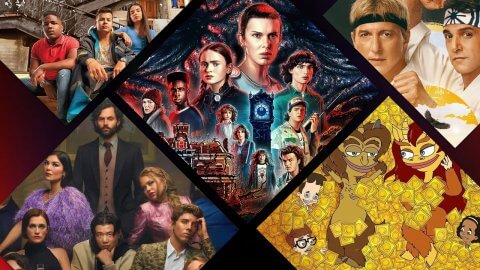
What’s the biggest thing we know about the streaming wars? That we don’t know much.
Netflix only releases ratings selectively every quarter, so usually, we have to wait until an earnings call to find out how their content is performing.
Until now! In August, Nielsen started releasing a weekly top ten list for streaming. Meanwhile, Netflix has a daily top ten list in every country. Add in a few more firms who have started parceling out some data, and we know more than we used to. Over the last couple of weeks, I’ve been analyzing these data sources to figure out who is doing well in the content wars. (See here or here for example.)
The king of the streaming wars right now is Netflix. So naturally, I had a lot of thoughts that fit over here at What’s on Netflix. Here are four insights on Netflix’s content has been performing.
Netflix Is Still the King in Streaming
If you’ve read me for any length of time, you’ll know I’m a bear on Netflix’s stock price. Frankly, the stock price is like Tesla’s: the underlying fundamentals don’t support it.
So let me be clear upfront: Netflix is clearly far ahead of everyone else in streaming. I have concerns about Netflix, but I’m not blind to what they’ve accomplished.
According to Nielsen’s US data, Netflix gets twice as much viewing as the next streamer, Prime Video.
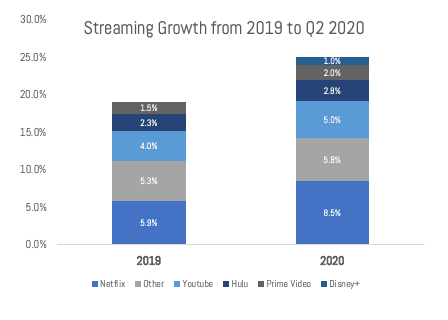
Nielsen is a Broadcast Channel
I argued on my own site that the streaming wars are increasingly competitive. This is true! But one could argue the opposite just as easily: Netflix still owns the majority of the most popular shows in streaming. At Decider, I compared each streamer’s top show to each other. But look at Netflix’s four top shows by Google Trends data compared to Amazon Prime Video’s only (major) show released in August and September:
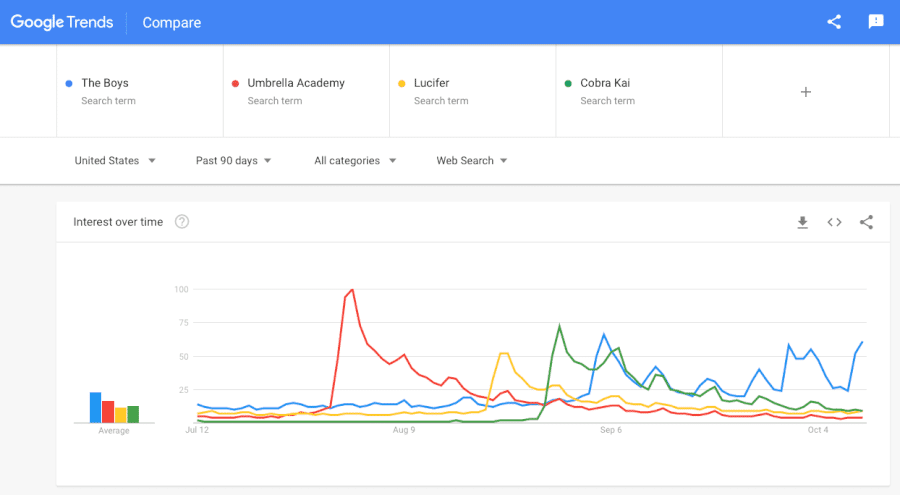
Google Trends
Arguably, Cobra Kai and Lucifer are each almost as popular as The Boys, and Netflix then had Umbrella Academy. You can see this by looking at 7 Park’s summer rankings (Memorial Day to Labor Day) of top series and films.
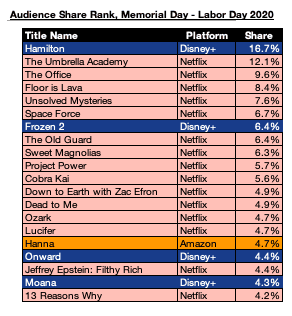
7 Park Share of Audience
Sure, Hamilton took the top spot, but Netflix owns three-quarters of the top 20 list. Using Nielsen’s data, 57 of the top 60 shows since August have been on Netflix. (Nielsen captures the top ten shows or films per week.)
Netflix Can Launch Anything (But That Doesn’t Mean They Do)
One of the narratives about Netflix that seems inescapably true is that they can (re)launch anything. The biggest example of this was the show You, which was a minor show on an American cable channel (Lifetime) and became a hit for Netflix. (The first example that is usually cited for this is Breaking Bad on AMC.)
The analogy I like to make is that Netflix is a broadcast channel in the United States, and increasingly around the world. What this means is that as many folks tune into Netflix as used to tune into a broadcast channel on a given night.
This turns the traditional model on its head. Historically, content would travel from a popular channel to a smaller one or smaller time slot. For example, a big sitcom would be on a broadcast channel, and then it would get syndicated to a smaller cable channel or local station. Now, content from a smaller cable channel (Lifetime) heads to a bigger platform (Netflix).
That said, I do think we overrate the importance of Netflix to the effect. Take Cobra Kai, the latest beneficiary of a so-called Netflix bump. The narrative is this was a show “no one” watched at Youtube, and now is a show everyone in America is watching. At best, I’d say, “Maybe.” When Cobra Kai premiered on Youtube, it still racked up tens of millions of views. Parrot Analytics called it the most in-demand streaming show in America.
Cobra Kai’s biggest problem was that no one subscribed to Youtube Red, Google’s failed SVOD pitch, and as a result, folks didn’t finish the episodes. In this case, it’s like a show that went from a cable channel no one had ever heard of to a broadcaster.
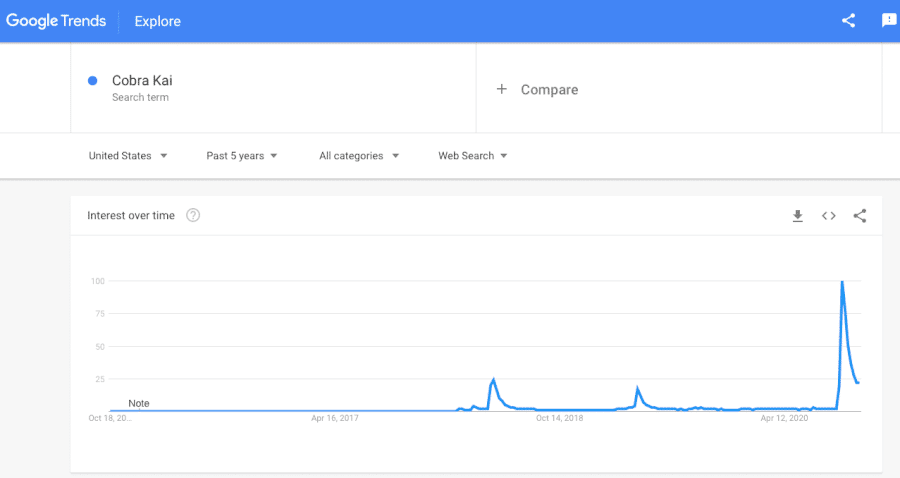
Google Trends Cobra Kai
Netflix can take a show and increase its buzz/popularity about four times. That’s the power of the “Netflix Effect”. Though, having a show that is good in the first place helps. And based on still memorable IP from the 1980s.
Netflix Still Doesn’t Own Most of Its Most Popular Content
The other trend in the data is that the majority of viewership on Netflix is still coming from shows that they don’t fully own. While Netflix labels many things “originals”, they are actually produced by the traditional studios. Those big shows I mentioned above? Lucifer, Umbrella Academy and Cobra Kai? They’re produced by Warner Bros, NBC Universal and Sony Pictures respectively.
Here’s the Nielsen total viewing weekly top ten lists from the start of August to the third week of September.
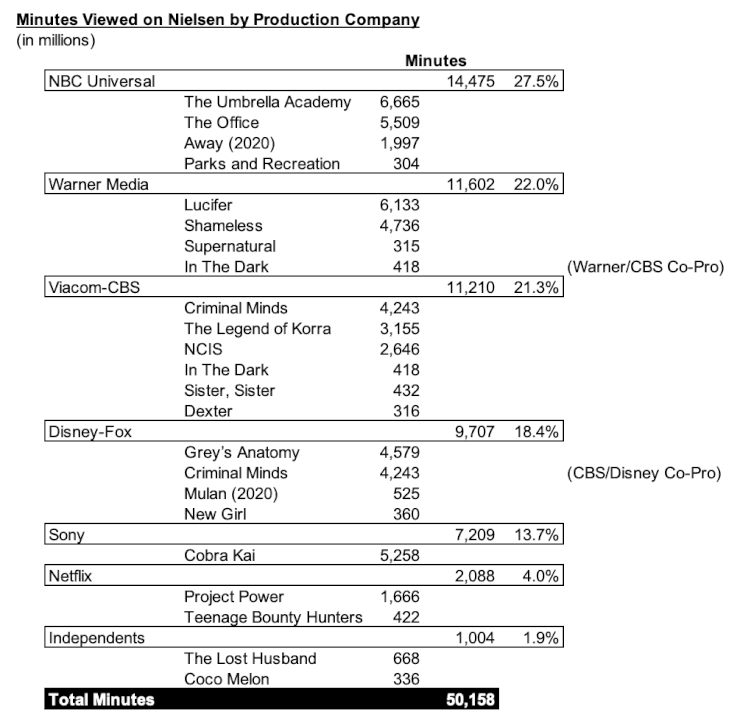
Nielsen Viewing CHART
Netflix only produces—which means they own content outright—about 4% of the content that makes up the top ten most viewed shows by total minutes viewed. Now, the caveat is that some of the deals Netflix makes now are almost like their own content. For example, they’ll license something for 5-7 years after the last season premieres on their platform, which is a huge holdback.
Moreover, even though they aren’t a producer on Umbrella Academy, they at least are credited as a distributor, which shows another level of control.
Still, I have strategic concerns about this. For all the hype about Netflix spending to compete with traditional players, for the most part Netflix still relies on those players.
Netflix Should Consider Weekly Releases
File this under topics I’ll never convince Netflix to implement, but I continue to think they leave some awareness on the table by not releasing their series in weekly installment. Not every series, but some.
Consider Umbrella Academy and The Boys. Both are about super-heroes. Both are doing well for their platforms, Netflix and Amazon respectively. Then look at this Google Trends report on how well they’re doing:
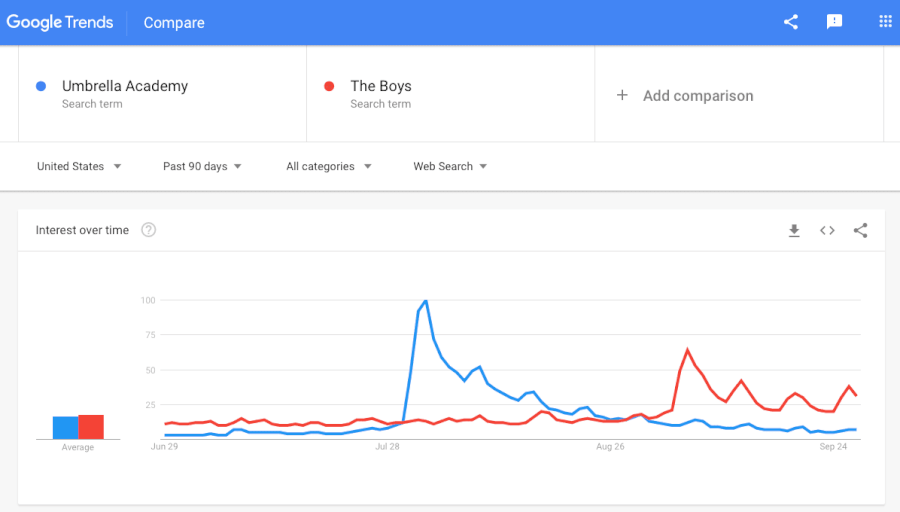
Google Trends
Even though The Boys had a higher peak, by week four it had dropped off the Nielsen weekly measurement charts. Meanwhile, The Boys actually grew in interest due to strong word of mouth. We saw the same thing last year with Game of Thrones and Stranger Things.
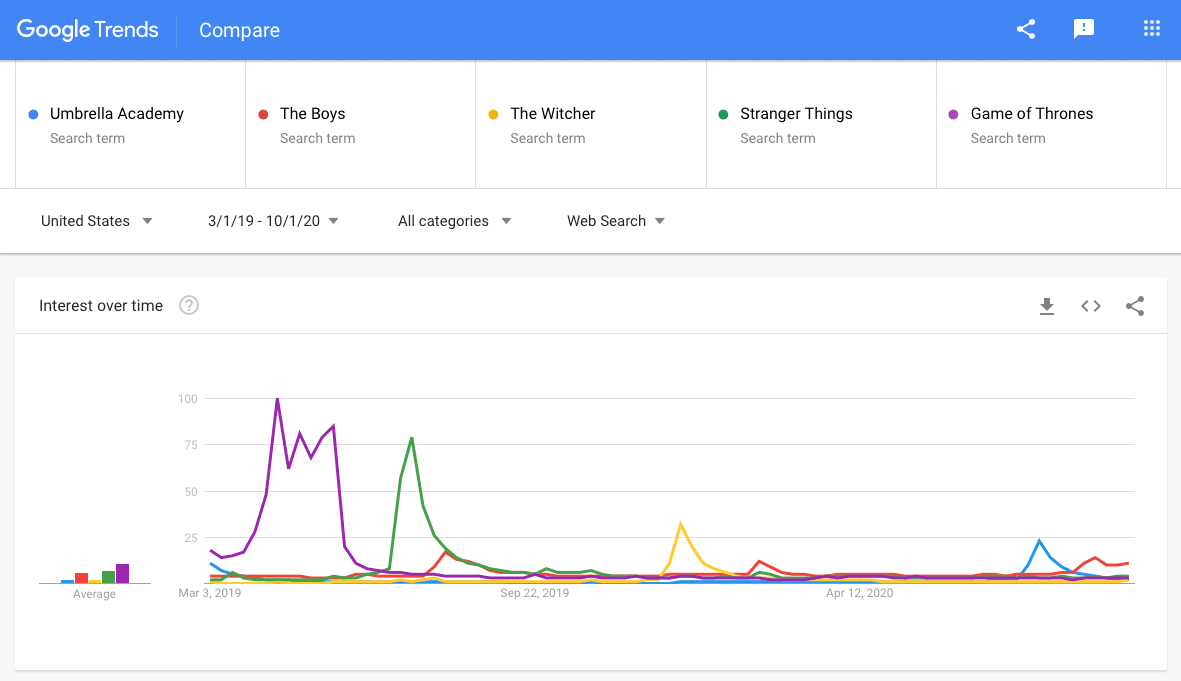
Google Trends GoT vs ST
Indeed, for the first time this spring, Netflix experimented with some installment releases for its reality competition Love is Blind. But for scripted series, they’ve gone back to the binge well.
Listen, Netflix is the king of streaming, so I’m hesitant to call their strategy wrong. Well, I’m not hesitant about it. But they should really consider making their tentpoles bigger and longer events.
(The Entertainment Strategy Guy writes under this pseudonym at his eponymous website. A former exec at a streaming company, he prefers writing to sending emails/attending meetings, so he launched his own website. Sign up for his newsletter at Substack for regular thoughts and analysis on the business, strategy and economics of the media and entertainment industry.)




